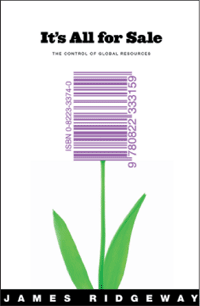
Our burgeoning tendency to regard the world’s diverse treasures less as aspects of the commonweal and more as goods to be bought and sold for corporate gain is at the core of James Ridgeway’s new book, It’s All for Sale. Fresh water, human body parts, even the sky itself are now becoming “commodities” in world trade.
Ridgeway grapples here with an old idea — that everything has a price. But he has documented new extremes in the commercial mindset that brought us plantation slavery, clearcutting old growth forests, and the hoovering up of every last edible fish in the ocean. His method of demonstrating just how far that mindset has gone is bluntly straightforward: He summarizes historical and present-day world trade in an exhaustive catalog of stuff that can be — and is — exploited for a profit, from cobalt and cocaine to genes and human excrement. And he often points to the jarring effects that a specific trade can have on citizens, consumers, and nations, such as the body-organ brokers in China who are literally profiteering on the bodies of death-row convicts.
There is surprisingly scant analysis here. While Ridgeway often seems to be building — statistic by statistic, fact by fact — toward a philosophical or political climax, in most chapters he shies away from conclusions. It’s All for Sale is thus most valuable as a reference work — a lean but handy encyclopedia of our age’s relentless blending of utilitarianism and greed.















